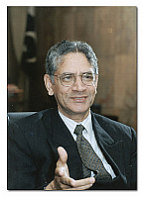Militant Islam and Washington neo-conservatives: Best friends of each other
Secretary Powell was remarkably convincing at the
Security Council about the gravity of threat posed
by Saddam, but questions remained as to
the imminence of the danger and whether war was the
best or the only response to overcome it.Indeed these
very questions are defining the current fierce and
acrimonious debate,both at home and abroad,about the
wisdom of going to war.
The international community shares,to varying
degree, the US concern about Iraq's intent and
capacity to develop weapons of mass destruction now
presenting a magnified and ever more deadly and real
threat with their likely nexus with terrorism.The
United States may, therefore, be right in
incorporating the battle against Saddam in the war on
terrorism. But why has it failed to make a case?
History guides us to an answer.
Yet again the world seems to have been divided in
two armed camps--one led by the militant Islam and the
other by Washington neo- conservatists .One is
peddling
a dangerously false and half-forgotten version of a
great religion to dominate the Islamic world. And the
other using its post Cold War monopoly of power to
guarantee unchallenged assertion of its will on what
is being seen as a menacing,unpredictable and
disorderly new world,to ensure its economic and
military strength as well as to widen the margin of
safety of its genuinely frightened and angered
citizens.
Ironically, the tragedy of September 11 has played
into the hands of both the camps,one using it as a
provocation and opportunity to seek public support for
the conservative agenda ,a work already in
progress,and the other exploiting the perceived
excesses of the war on terrorism to similarly arouse
an indignant Muslim world.An America initially wary of
Washington's resurgent neo-conservativism and moral
absolutism has been frightened by terrorism to
cosy up to the Administration to seek protection and
security.And the mainstream Islamic world that had
found militant Islam an anethma is now
terribly frightened and offended by this war on
terrorism , and is edging closer to the extremists.
The war on terrorism is also bringing pro-West
regimes in Islamic countries under severe internal
strains,and particularly hurting the credibility of
moderate and reformist intelligentsia there who had
long waged a silent struggle to isolate militant
forces.Now they themselves feel isolated and betrayed
by Washington whose policies seem to be raising ,if
not vindicating, the stature of radical Islamists as
the only true nationalistic and patriotic force.
The policies of Washington hard liners have thus
made them and the militant Islam each other's best
friends.Each has given the other a good campaign
issue in the name of which it can pursue its larger
agenda,visible as well as invisible.But what is
concealed is perhaps more revealing.
Washington hard liners are confident that the war
against Iraq is winnable.The feeling is that victory
will have silenced the critics and sceptics as the
success will provide its own rationale and the end
will justify the means.But what is the "end" going to
be?If it is to defeat Saddam,he will probably be
defeated without coming to battle.But there will
still be military operations as US occupies Iraq, with
as yet unspecified war aims that transcend or belie
the stated objectives. Its uncertain,and possibly
dangerous , consequences in Iraq and
beyond in the Islamic world ,in the short and long
term, should also count towards the "end"that has to
justify the means.
The end would also include the undermining of
confidence in international organizations specially
institutions such as IAEA inspections and the UN
Security Council even though France,China and Russia
may acquiese at the end of the day to give a fig leaf
support to the United States in the interest of saving
the credibility of the UN system and their relations
with Washington.
Also damaged in the process will be the established
and acceptable principles governing the use of force
tempting or prompting many regional powers in the
future to go for pre-emptive strikes making for fresh
instability in the world.One is already beginning to
see its impact on the India -Pakistan tensions.
One may ridicule the Arab countries as failed
societies,but let it be clear they are far from being
clones of Taliban led Afghanistan or re-incarnation of
post World War shattered Europe and Japan ,where
a saviour can easily impose its will and fashion them
in its own image.In their post colonial
history many of these traditional societies have been
in conflict within, in their search for national
identities, political stability and way to
successfully absorb modern liberal values,not an easy
task in an environment where religion remains central
to culture.Historically, the Islamic world has
perceived,fairly or unfairly,the United States as
having become a party to their internal conflict in
the interest of advancing its oil interests and
geo-strategic objectives, thus complicating the
above search.And now comes the war on terrorism,that
is being increasingly seen across the Islamic world as
a war on Islam,fueling further anti-West sentiments.
America's anticipation ,therefore, of being received
with open arms and confidence in reforming the
Arab countries may be misplaced,because it is seen as
part of the problem not the solution.Washington will
be surprised to know that the liberal and moderate
elements it may be banking on for support remain as
wary of America,if not anti-American, as the
traditional and the conservative.
War is a not a gamble.You do not play
for so many vague, unintended and unforeseen
cosequences,including another horrible incident like
nine eleven, with a single irrevocable move.
| 


